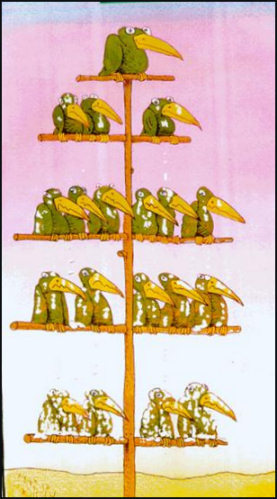PRINT ON DEMAND (POD) AND THE PECKING ORDER
Wherever humans gather a pecking order will emerge. A few of us may be lucky enough to stand at the top of that order but most of us will land somewhere in the middle or at the bottom. This phenomenon is important to remember as we struggle to make our way in life. The American dream suggests “everyone can make it if they try.” But the dream flies in the face of reality and statistical probability. The notion is useful only as a spur to do our best because when we do our best society works better.

(courtesy: bing.com/images)
A pecking order exists in the publishing industry, of course. Self-publishing gets the least respect — though as independent presses disappear or get acquired by larger ones, more writers are turning to this venue to get their books to the public. The trend is becoming so popular, in fact, some former book agents are reinventing themselves to cash in (Blog: 1/18/2011).
Print On Demand (POD) publishers don’t get much respect either. They come in a variety of shapes. All of them use laser rather than off-set printing because it allows them to assemble each book as it is sold rather than having to produce large quantities, which is where the economy lies in traditional printing. POD also eliminates the cost for warehousing off-set books as they wait to be sold. Some POD houses offer packaged services like the tiers of a television cable company. Others operate at no cost to the author.
As to self-publishing and POD publishers who offer packages, the difference between them seems negligible and I suspect self-publishing is more profitable for the author. But a small press that requires nothing of its author but a solid piece of work shouldn’t be shunned because of its place in the pecking order. A writer’s concern should be for the quality of the publication, which includes not only the book’s cover but its editing. On the plus side, POD books do get reviewed and libraries will purchase them for their collections, unlike self-published material. The author’s remuneration varies, however, so anyone contemplating a contract with a POD publisher should be certain the terms are clear and fair and that ownership rights revert to the author.
While the book industry is sorting itself out, I’d advise a writer to ignore the debate about where POD stands in the pecking order. A writer who has been careful in his work and has a good story to tell has a better chance of being published with a POD company than waiting to be discovered by an agent. But be warned, small presses that survive from book sales and not by shifting costs to their authors have a large number of submissions and competition can be fierce.